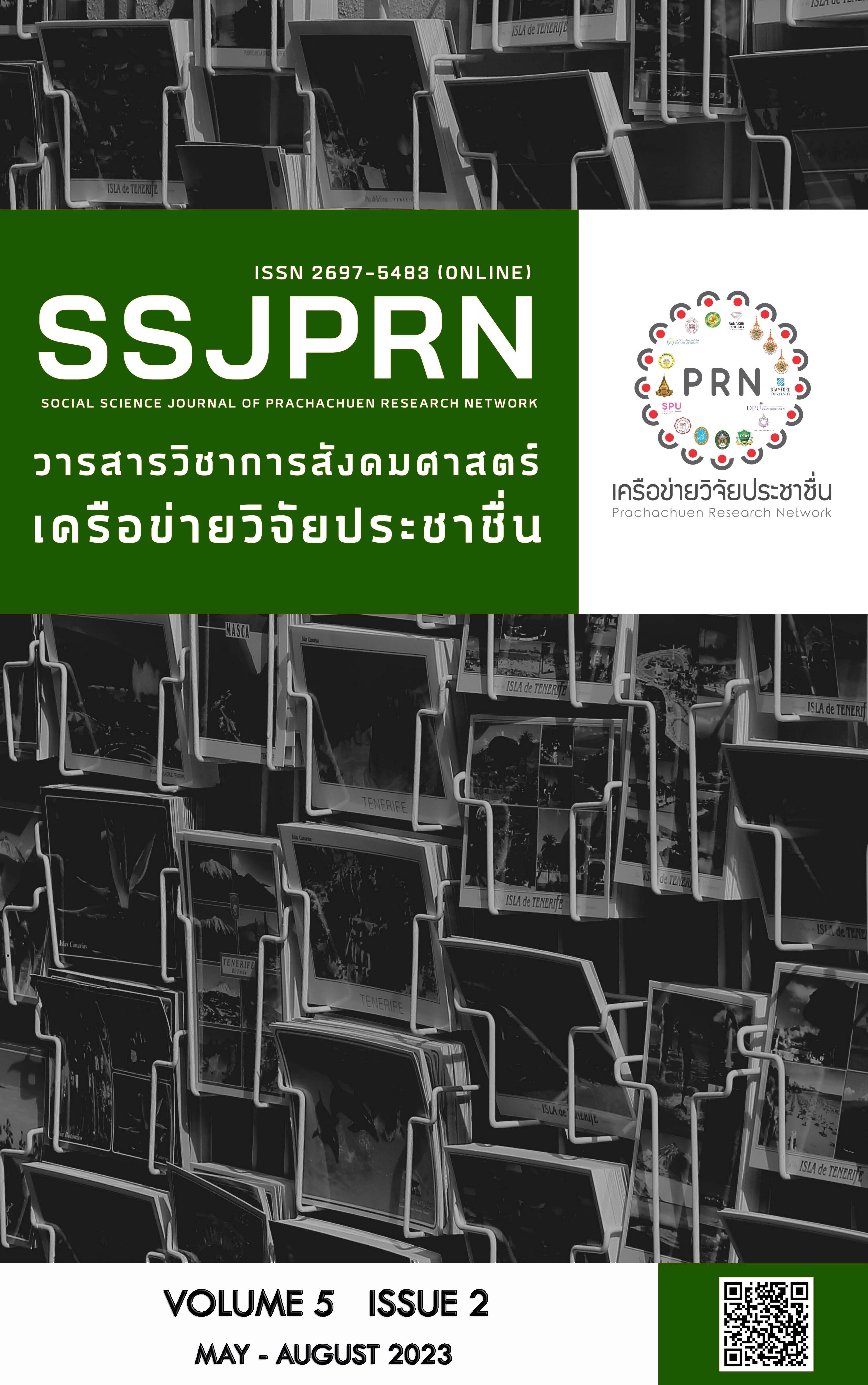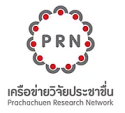ความสัมพันธ์ระหว่างค่าความนิยมจากการรวมธุรกิจและคุณภาพกำไร ของบริษัทจดทะเบียนในตลาดหลักทรัพย์แห่งประเทศไทย
คำสำคัญ:
ค่าความนิยม , การรวมธุรกิจ , คุณภาพกำไรบทคัดย่อ
งานวิจัยนี้มีวัตถุประสงค์เพื่อ 1) สำรวจค่าความนิยมจากการรวมธุรกิจของบริษัทที่จดทะเบียนในตลาดหลักทรัพย์แห่งประเทศไทยโดยจำแนกตามกลุ่มอุตสาหกรรม และ 2) ศึกษาความสัมพันธ์ระหว่างค่าความนิยมจากการรวมธุรกิจกับคุณภาพกำไรของบริษัทที่จดทะเบียนในตลาดหลักทรัพย์แห่งประเทศไทย โดยมีขนาดของบริษัทและโครงสร้างเงินทุนเข้ามาเป็นตัวแปรควบคุม กลุ่มตัวอย่าง คือ บริษัทจดทะเบียนในตลาดหลักทรัพย์แห่งประเทศไทยประจำปี พ.ศ. 2564 จำนวน 156 บริษัท เทคนิคทางสถิติที่ใช้ คือ การวิเคราะห์ความถดถอยเชิงพหุคูณ เก็บรวบรวมข้อมูลจากงบการเงินรวม หมายเหตุประกอบงบการเงินและแบบแสดงรายการข้อมูลประจำปี (แบบ 56-1) ของบริษัทจดทะเบียนในตลาดหลักทรัพย์แห่งประเทศไทย
ผลการวิจัยพบว่าค่าความนิยมจากการรวมธุรกิจมีความสัมพันธ์ในทิศทางตรงกันข้ามกับคุณภาพกำไรตามวิธีรายการคงค้างจากการดำเนินงานสุทธิอย่างมีนัยสำคัญทางสถิติ การรวมธุรกิจจะก่อให้เกิดการใช้ทรัพยากรร่วมกันอย่างมีประสิทธิภาพมากขึ้น และลดความเสี่ยงจากผลการดำเนินงานของกิจการ ส่งผลให้มีผลการดำเนินงานที่ดีขึ้น สำหรับตัวแปรควบคุมซึ่งประกอบด้วยขนาดบริษัทมีความสัมพันธ์ในทิศทางเดียวกันกับคุณภาพกำไรตามวิธีรายการคงค้างจากการดำเนินงานสุทธิอย่างมีนัยสำคัญทางสถิติ และโครงสร้างเงินทุนมีความสัมพันธ์ในทิศทางตรงกันข้ามกับคุณภาพกำไรตามวิธีรายการคงค้างจากการดำเนินงานสุทธิและโครงสร้างเงินทุนมีความสัมพันธ์ในทิศทางเดียวกันกับคุณภาพกำไรตามวิธีอัตราส่วนคุณภาพกำไรอย่างมีนัยสำคัญทางสถิติ
เอกสารอ้างอิง
ชุติมา ธัชยะพงษ์. (2552). ความสัมพันธ์ระหว่างค่าความนิยมจากการรวมธุรกิจและคุณภาพกำไรของบริษัทจดทะเบียนในตลาดหลักทรัพย์แห่งประเทศไทย. (วิทยานิพนธ์ปริญญามหาบัณฑิต, มหาวิทยาลัยเชียงใหม่).
ฐิติรัตน์ มีมาก, นิโลบล นาคะเลิศกวี, เขมญา คินิมาน และอุษณีย์ ชื่อยืนยง. (2562). ค่าความนิยมจากการรวมธุรกิจกับคุณภาพกำไร. วารสารวิชาการสถาบันเทคโนโลยีแห่งสุวรรณภูมิ, 5(1), 37-59.
ดารานาถ พรหมอินทร์ และ กุสุมา ดำพิทักษ์. (2561). ความสัมพันธ์ของผลการดำเนินงานและคุณภาพกำไรต่อราคาตลาดหลักทรัพย์ของบริษัทจดทะเบียนในตลาดหลักทรัพย์แห่งประเทศไทย กลุ่มอุตสาหกรรมเทคโนโลยี. วารสารวิทยาลัยบัณฑิตศึกษาการจัดการ มหาวิทยาลัยขอนแก่น, 11(2), 37-59.
ธัญลักษณ์ วิจิตรสาระวงศ์. (2559). ค่าความนิยมนั้น สำคัญไฉน. FAP Newsletter, 44(8), 10-11.
ธิดา อู่ทรัพย์เจริญชัย. (2548). ความสัมพันธ์ระหว่างคุณภาพกำไรกับรายงานของผู้สอบบัญชี. (วิทยานิพนธ์ปริญญาบัญชีมหาบัณฑิต, จุฬาลงกรณ์มหาวิทยาลัย). สืบค้นจาก https://doi.nrct.go.th//ListDoi/listDetail?Resolve_DOI=10.14457/CU.the.2005.1525
ประไพพิศ สวัสดิ์รัมย์. (2559). ปัจจัยที่มีอิทธิพลต่อคุณภาพกำไรของบริษัทจดทะเบียนในตลาดหลักทรัพย์แห่งประเทศไทย. วารสารวิชาการมหาวิทยาลัยฟาร์อีสเทอร์น, (10)1, 143-155.
ภัทราวดี สิงห์สุพรรณ. (2562). ปัจจัยที่มีอิทธิพลต่อความเสี่ยงด้านโครงสร้างทางการเงินของบริษัทจดทะเบียนในตลาดหลักทรัพย์แห่งประเทศไทย กลุ่ม SET 100. (วิทยานิพนธ์ปริญญาบัญชีมหาบัณฑิต, มหาวิทยาลัยธุรกิจบัณฑิต). สืบค้นจาก http://libdoc.dpu.ac.th/thesis/Pattarawadee.Sin.pdf
เมตตา เสมสมบูรณ์. (2560). ความสัมพันธ์ระหว่างค่าความนิยมจากการรวมธุรกิจกับอัตราส่วนทางการเงินของบริษัทในกลุ่มอุตสาหกรรมบริการที่จดทะเบียนในตลาดหลักทรัพย์แห่งประเทศไทย. วารสารเกษมบัณฑิต, 18(1), 82-96.
ลัคนา พูลเจริญ และวันชัย ประเสริฐศรี. (2558). ความสัมพันธ์ระหว่างค่าความนิยมที่เกิดจากการซื้อธุรกิจกับความสามารถในการทำกำไรของบริษัทจดทะเบียนในตลาดหลักทรัพย์แห่งประเทศไทย. RMUTT Global Business and Economics Review, 10(1), 133-144.
วรศักดิ์ ทุมมานนท์. (2543). คุณรู้จัก Creative accounting และคุณภาพกำไรแล้วรึยัง. กรุงเทพฯ: บริษัท ไอโอนิค อินเตอร์เทรด รีซอสเซส จำกัด.
Alarussi, A. S., & Alhaderi, S. M. (2018). Factors affecting profitability in Malaysia. Journal of Economic Studies, 45(3), 442-458.
Anderson, D. R., Sweeney, D. J., & Williams, T. A. (2002). Statistics for Business and Economics. (8th ed.). Chicago: R.R.Donnelley & Sons.
George, C. R., & Norman, O. O. (1974). Accounting for Goodwill. New York: American Institute of Certified Public Accountants.
Henning, S. L., Shaw, W. H., & Stock, T. (2004). The Amount and Timing of Goodwill Write-offs and Revaluation: Evidence from U.S. and U.K. Firms. Review of Quantitative Finance and Accounting, 23(2), 99-121.
Jennings, R., Robinson, J., Thompson, R. B., & Duvall, L. (1996). The Relation between Accounting Goodwill Numbers and Equity Values. Journal of Business Finance & Accounting, 23(4). 513-533.
Jiraporn, P., Miller, G. A., Yoon, S. S., & Kim, Y. S. (2008). Is earnings management opportunistic or beneficial? An agency theory perspective. International Review of financial Analysis, 17(3), 622-634.
McCarthy, M. G., & Schneider, D. K. (1995). Market Perception of Goodwill: Some Empirical Evidence. Accounting and Business Research, 26(winter 1995), 69-81.
Modigliani, F., & Miller, M. H. (1963). Corporate Income Taxes and the Cost of Capital: A Correction. American Economic Review, 53, 433-443.
Ranjith, VK. (2016). Business Models and Competitive Advantage. Procedia Economics and Finance, 37, 203-207.
Serrasqueiro, Z., & Caetano, A. (2015). Trade-off theory versus pecking order theory: capital structure decisions in a peripheral region of Portugal. Journal of Business Economics and Management, 16(2), 445-466.
ดาวน์โหลด
เผยแพร่แล้ว
รูปแบบการอ้างอิง
ฉบับ
ประเภทบทความ
สัญญาอนุญาต
ลิขสิทธิ์ (c) 2023 วารสารวิชาการสังคมศาสตร์เครือข่ายวิจัยประชาชื่น

อนุญาตภายใต้เงื่อนไข Creative Commons Attribution-NonCommercial-NoDerivatives 4.0 International License.
บทความที่ได้รับการตีพิมพ์เป็นลิขสิทธิ์ของวารสารวิชาการสังคมศาสตร์เครือข่ายวิจัยประชาชื่น







